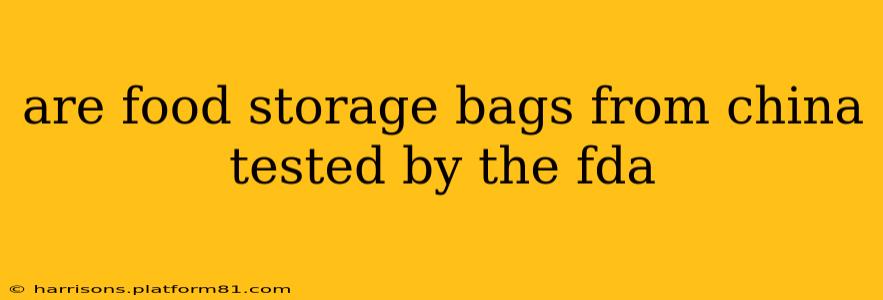The question of whether food storage bags from China are tested by the Food and Drug Administration (FDA) is a common concern for consumers prioritizing food safety. The answer isn't a simple yes or no, but rather a nuanced exploration of FDA regulations, import processes, and the complexities of global manufacturing.
While the FDA doesn't directly test every single food storage bag imported from China (or any other country), it does have a robust system in place to ensure the safety of food contact materials entering the US market. Understanding this system is crucial to addressing the core concerns behind this question.
How the FDA Regulates Food Contact Materials
The FDA's authority stems from the Federal Food, Drug, and Cosmetic Act (FD&C Act). This act dictates that food contact substances, including food storage bags, must not migrate harmful substances into food at levels that would pose a health risk. This means manufacturers are responsible for ensuring their products meet these standards.
The FDA's approach relies on a combination of strategies:
-
Pre-market notification (not mandatory for all materials): Certain types of food contact substances require pre-market notification (under section 409 of the FD&C Act). This means manufacturers must provide data demonstrating the safety of their materials before they are marketed. However, this is not a blanket requirement for all food storage bags.
-
Testing by manufacturers: Manufacturers are responsible for conducting testing to demonstrate compliance with FDA regulations. This testing should show that the material used is safe for food contact and meets established standards. However, the FDA doesn't directly oversee every single test conducted.
-
Sampling and testing by FDA: The FDA conducts random sampling and testing of imported goods, including food contact materials. These tests help to monitor the safety of products on the market and identify potential problems. Importantly, the FDA's resources are limited, making comprehensive testing of every imported product impossible.
-
Import alerts and enforcement actions: The FDA issues import alerts for products found to violate safety standards. They also take enforcement actions against companies that fail to comply with regulations.
Are there specific standards for food storage bags from China?
There aren't separate standards for food storage bags based solely on their country of origin. The FDA regulations apply equally to all food storage bags imported into the United States, regardless of where they are manufactured. The key is whether the materials and manufacturing process comply with FDA regulations.
What should consumers look for when buying food storage bags?
Given the complexities of FDA oversight, consumers should take proactive steps to protect their families:
-
Look for FDA compliance statements: Check for labels indicating that the bag is compliant with FDA standards for food contact.
-
Reputable brands: Purchase from reputable brands known for quality control and food safety. These brands are more likely to have undergone rigorous testing.
-
Material composition: Be aware of the materials used in the bags. Some materials are more prone to leaching chemicals than others. Check the product label for specifics.
What about third-party testing?
Consumers can also seek out third-party testing results. Some organizations specialize in testing food contact materials for harmful substances. However, these tests aren't always easily accessible or affordable for individuals.
Conclusion
In short, the FDA doesn't directly test every food storage bag from China, but it utilizes a regulatory system to ensure that imported products meet safety standards. Consumers should prioritize purchasing from reputable brands that comply with FDA regulations and are transparent about their manufacturing processes. Ultimately, responsible sourcing and careful consideration of labeling information are your best defenses in ensuring food safety.
